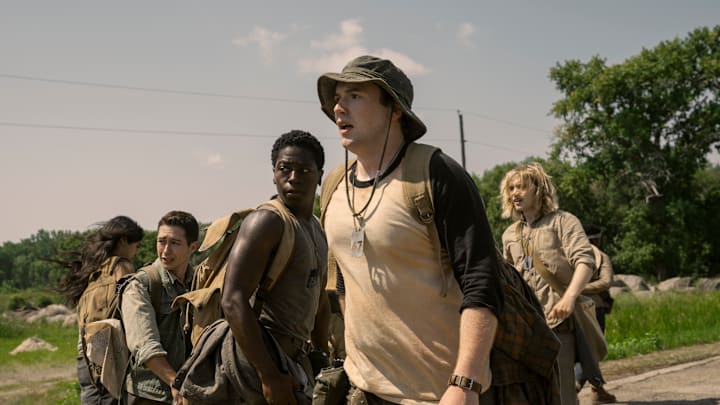Adapting a Stephen King property (much less a novel by his dark alter-ego Richard Bachman) is daunting. Fortunately, The Long Walk is a strong adaptation that is likely to leave its own legacy. Director Francis Lawrence (also known forThe Hunger Games) taps into the unique darkness of the world of King’s novel and highlights the war between hope and hopelessness.
The Long Walk is set in a dystopian version of 1970s America, if a totalitarian regime ruled it. Each year, there is an event known as “The Long Walk,” where 50 boys are forced to walk continuously, and the winner receives a cash prize and the granting of one wish. However, there’s a pretty big catch—any boy who stops walking is immediately executed, meaning the winner is also the lone survivor. Ray Garraty is one of the 50 contestants, and we follow his journey as he strives to win without losing his humanity along the way.

The Long Walk features thoughtful conversations and strong leading performances
Something I was curious about heading into this film was the pacing. With a movie centered around walking, with little else to fill the runtime, I was concerned that the gaps between killings would drag. However, the pacing surprised me with how quickly everything flew by—rather than feeling like an unpleasant gorefest with overlong gaps of nothing between, the conversations between the boys are the heart of the film.
The boys entertain one another by discussing their political views on the government. Some are interested in toeing the line and avoiding retaliation from the military presence all around them. Others are more interested in rebellion, and the film tackles difficult (though fairly surface-level) conversations about the individual’s responsibility in an oppressive government. The walking and talking hold our attention and give us insight into the film’s philosophy.
The Long Walk also takes the moments of walking to build the characters’ ideas of masculinity. Each boy is unique in how they handle their circumstances, ranging from physical violence to quiet stoicism. Casual homophobia, particularly towards the main characters and their close friendship, is rampant in the earlier part of the film. Yet, as the contest wears on, their masks fall away, revealing the performance behind their behavior.
While I do wish the televised element of the contest was more prominent, I can understand why it fell to the side. We need to spend as much time as possible understanding the boys and their place in the system, so speaking any further about the fanaticism around the event would be distracting.
These lengthy stretches of walking would also fall flat without strong leads—fortunately, this film has Cooper Hoffman and David Jonsson. Hoffman, who plays Ray, and Jonsson, who plays Pete, unflinchingly guide us through this terrible journey, much like their characters try to guide their small group of Musketeers down the road.

Friendship is just as crucial as violence to The Long Walk’s message
Hoffman is instantly likable as Ray. I could immediately buy into this character who reflexively reaches out to help the other boys, even as he struggles with anger. He stands solidly at the center of this movie as a conflicted yet kind-hearted leader of the pack. However, it is Jonsson who lights up the screen, making Pete a welcome addition to any scene. His ability to portray warmth alongside a dogged toughness makes us understand why Ray clings to Pete throughout the contest.
Hoffman and Jonsson’s chemistry is essential to the film’s success because friendship is perhaps just as crucial to its message as violence and horror. Friendship is not some cliche counterspell to the evil around them—love does not stop the onslaught of violence. Instead, love is portrayed as essential to human survival, and the core group of boys does not shy away from it. They acknowledge that their friendship may be fleeting, but they would rather have it now than not at all, which helps them through the roughest points in the contest.
However, their friendship makes the many losses on the road even more difficult to stomach. While the deaths are cruel, having to watch their friends walk on and helplessly listen to their distant screams is even worse. The contest and their government only value what each boy can contribute, and if they are too weak, scared, or angry to continue, they are eliminated. Their friends must cope with the fact that they cannot intervene, or they will be next. Their dehumanization is essential to our understanding of this government's true evil.
The film’s message is all the stronger because the characters are all well cast. The supporting boys don’t just fade into the background as nameless, faceless cannon fodder. Some of the biggest standouts include Charlie Plummer as the troubled Barkovitch, Garrett Wareing as fit rival Stebbins, and the rest of the Musketeers, Ben Wang’s Hank, and Tut Nyuot’s Arthur. Of course, Mark Hamill brings the necessary menace to The Major, making him hateable and almost comically grotesque.
While many things should not work in this film, emotional leading performances and a consistent feeling of dread hold everything together. The Long Walk is a brutal and heartbreaking exploration of how love and hope can manage to exist in a world that seeks to control and destroy.
